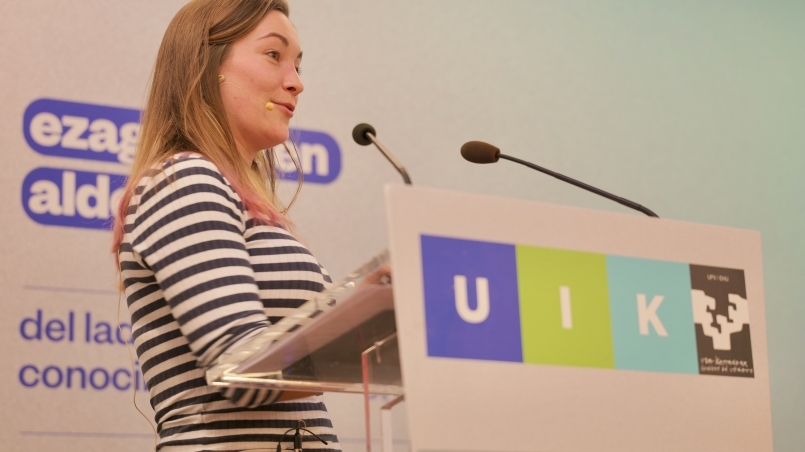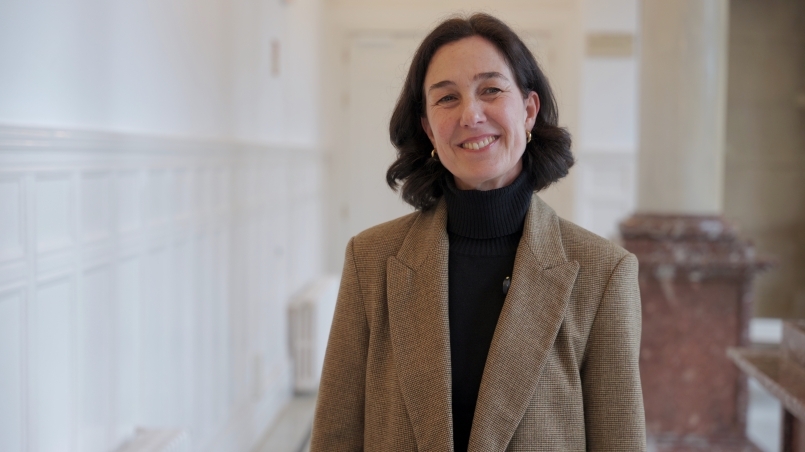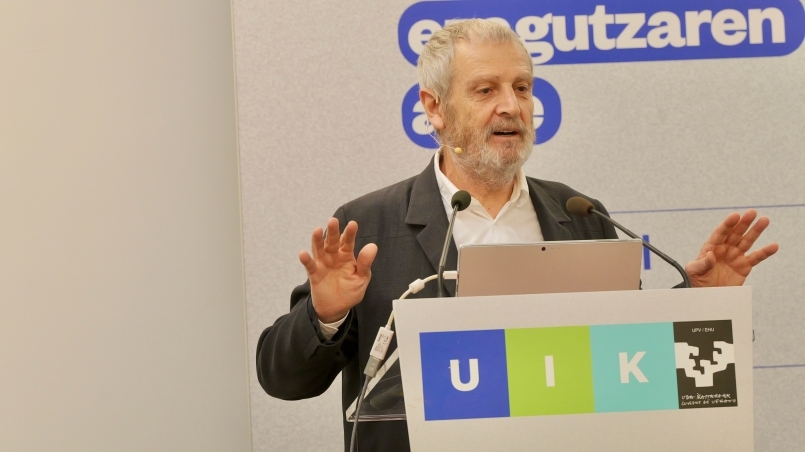Enrolment for the summer courses now open
The UPV/EHU Summer Courses invite you to explore new perspectives from the knowledge side. Artificial intelligence, sustainability and participation will be the most outstanding challenges of this edition.
The 43rd UPV/EHU Summer Courses have today been unveiled at the BBVA Foundation headquarters in Bilbao. Eva Ferreira, Rector of the UPV/EHU, Laura Poderoso, Deputy Director of the BBVA Foundation, and Itziar Alkorta, the Summer Course Academic Director, gave a detailed breakdown of this year's courses.
The programme includes nearly 200 activities and will run from mid-June to the end of September. The majority will be held in Donostia/San Sebastián, Bilbao, Vitoria-Gasteiz and Bayonne; beyond the cities, Arantzazu, Azpeitia, Balmaseda, Beasain, Bermeo, Gernika, Hondarribia, Lesaka, Ordizia, Plentzia and Zaldibia will also host courses.
Eva Ferreira, Rector of the UPV/EHU, stressed that "the social impact is essential for the summer courses of the University of the Basque Country. We firmly believe in the importance of education for people's lives and society's progress. That is why, along with formal training we offer, this initiative allows us to extend our social commitment; it fosters reflection, discussion and focuses academic attention on topical challenges and problems".
UIK, knowledge observatory and meeting place for all citizens
The UPV/EHU Summer Courses Foundation (UIK) is a dynamic observatory of the knowledge that it organises in conjunction with many different institutions and experts working in this field. The Summer Courses showcase the main challenges facing society, and foster reflection, debate and the transfer of knowledge, thus generating a social impact for change.
The contribution and support by the Basque Government, Gipuzkoa Provincial Government, Donostia City Council and the BBVA Foundation have been essential in the development of this project.
The UPV/EHU summer courses are a meeting point between stakeholders from all social spheres and the general public; the outcome is a constant convergence of the knowledge.
To quote the UIK Academc Director, Itziar Alkorta, “we want to bring together people from all walks of life; thus, creating a meeting place for professionals from different fields – academia, the business world, the administrations and social stakeholders – and reaching out to different generations. We have therefore worked with different agents to prepare a programme with something for everyone.”
A programme structured by strategic cycles
The summer courses will address the main challenges of the day. The offering has been structured by strategic cycles; particularly noteworthy are the courses linked to Culture and Art, along with those on Society, Education, Science & Technology, Health, Law, and Economy & Business.
Artificial Intelligence and sustainability, the main challenges of the day
Our era could not be understood without special mention of artificial intelligence and sustainability. Both are essential factors that are influencing every area; they will play an important role in this year's Summer Courses, as can be seen from the programme.
The main cycles of the 2024 courses are set out below, together with an initial overview of the courses offered in each of them:
Culture and Art
The UPV/EHU summer courses give particular importance to the field of culture and art. Two conferences have been organised within this cycle: on the one hand, the International Convention on the Cultural Depictions of the Bombing of Gernika and on the Updating and Transmedia Phenomena of the Painting of Pablo Picasso; on the hand, a conference will be held on art, culture and heritage to follow on from the KulturGest Bilbao courses. As regards heritage, the cultural foundations that link the future of Arantzazu to the Basque Country will be analysed together; the current status of the maritime heritage of Bizkaia and the challenges regarding its conservation and viability will be considered. As regards important artists, the documentary legacy of Nestor Basterretxea, the sculptor, painter and film-maker, will be studied; as you would expect, a panel has been organised on Chillida and his work to mark the centenary of the birth of the sculptor. As parallel cycles, there will also be a wide offering related to architecture and urbanism, as well as to language and literature, where the spotlight will be on, for example, the literary world of Arantxa Urretabizkaia.
Society
Society is facing great challenges which will be examined from different angles. The wars in Ukraine and Gaza will be at the fore. The international context and some aspects of the two conflicts that have created the greatest tension in recent years will be analysed, in an approachable and educational way, yet ensuring academic rigour. Furthermore, the effects of the youth digital culture on socialisation and emotional-sexual education from a feminist perspective will be studied; different experiences for active citizens will be showcased; the possibilities of the new technologies serving just and ethical social innovation will be explored; the XV International Meeting of Culture, Communication and Development on Migration, Identity, Racism and Coexistence will be held; courses will be taught on the social impact of institutions and, in particular, of the UPV/EHU, among the many others to be run.
Education
The offering of the education cycle will be broad. Participation, awareness and training in childhood as a lever to foster change will be discussed; in conjunction with the Ararteko [Basque Ombuds], the challenges of equity in education and schooling will be debated; as regards sex educations, pointers will be given to help during childhood and adolescence; new education trends and intervention trends for the needs of students with dyslexia and sensory impairment will be analysed; and, pedagogy of death will be another of the themes to be explored.
Science and Technology
Science and technology will play an important role, and the spotlight will be on discussing the challenges and opportunities of Artificial Intelligence. The different fields of application of artificial intelligence (education, mobility...) and its potential for sustainable transformation will be expounded. Quantum technologies and the new approaches in the field of biotechnology, biomedicine and biomimesis are some of the areas that will be covered within science and technology. The offering will be very diverse.
Law
Law provides the opportunity to govern social coexistence and settle disputes with legal implications. Many areas will be addressed in this section. Gender violence will be under the magnifying glass to consider the legal changes and their practical application; data protection ensuing from the digitalisation of teaching will be examined; migrant children and human rights will be discussed; and there will be a course on open parliament and new governance models. As a parallel cycle, there will an interesting selection of courses on criminology.
Health
Lifelong learning is a cornerstone for professionals of the healthcare sector and, in general, for society. Many themes, such as mental health from a feminist and sociocultural perspective, will be proposed; there will an in-depth analysis of the impact of climate change on occupational health, in order to assess and appropriately manage the new risks that may emerge in the field of occupational health and safety; economic assessment to help with making financial decisions in the health field; the language disorders that bilingual children experience in their development will be discussed; and, inter alia, the Adinberri Innovation Strategic Agenda, aimed at preventing the frailty and dependency of older people will be shared with stakeholders and the general public. The programme of psychology courses can be consulted as a parallel cycle.
Economy and Business
People interested in this area will find a large variety of courses on the development of the economy and the company. In order to provide a comprehensive view, different courses will analyse the state of the Basque economy from the perspective innovation and the steps to be taken to attract international talent; points for small and medium-sized enterprises to adapt to the green transition and remain competitive will be discussed; the transition to a sustainable blue economy will be examined; and conventional economic thought will also be considered in the courses on the Transformative Social Economy and Critical Economy.
UIK in the world
UIK considers the international approach to knowledge transfer to be strategic. The contribution of foreign experts and students is important; this year's offering includes many courses in that direction, including: the law courses on international relations, the course on "the digital transformation and the futures of education: challenges in the Basque Country and in Ibero-America", which will be run in conjunction with the Organization of Ibero-American States for Education, Science and Culture (OEI); the Basque Culture International Summer School for foreign students to learn about Basque society from internationally renowned lecturers; and, as already mentioned, the International Convention on the Cultural Depictions of the Bombing of Gernika and on the Updating and Transmedia Phenomena of the Painting of Pablo Picasso will be held, along with the XV International Meeting of Culture, Communication and Development on Migration, Identity, Racism and Coexistence, inter alia.
Along with the Summer Courses, UIK organises specialist courses throughout the year and in which international experts take part.
Furthermore, the III Cross-border Summer Courses has been organised with different universities and institutions, with the aim of fostering knowledge transfer and territorial cohesion.
Encouraging participation
As regards the methodology, nearly all the courses will be face-to-face and will be available live online in the majority of cases. Along with the traditional formats, different methodologies will be used in order to enable the transfer of know-how and to encourage participation in over twenty of the Summer Courses. Four of the courses that will be run using participatory methodologies are part of the TopaGune project, which has the backing of Gipuzkoa Provincial Council.
Apart from the participatory courses, experiential courses are also being run, such as the one on the Saltillo school boat, where the participants will experience the cross-border exploration of the health of the marine environment during a crossing lasting several days.
Enrolment is open
Enrolment is open and people wishing to attend can sign up until the start of each course.
Period: from 23 April to the start of each course
Registration: www.uik.eus
Information on the UPV/EHU Summer Courses: www.uik.eus
Discounts on the price of the enrolment and accommodation are available for certain groups. The detailed datasheet for each course should be consulted, along with the general information on prices.
Students between 18 and 25 will be able to benefit from the 25² (25 squared) plan to facilitate youth enrolment. They can register for €25 a course, provided they sign up before 31 May.


